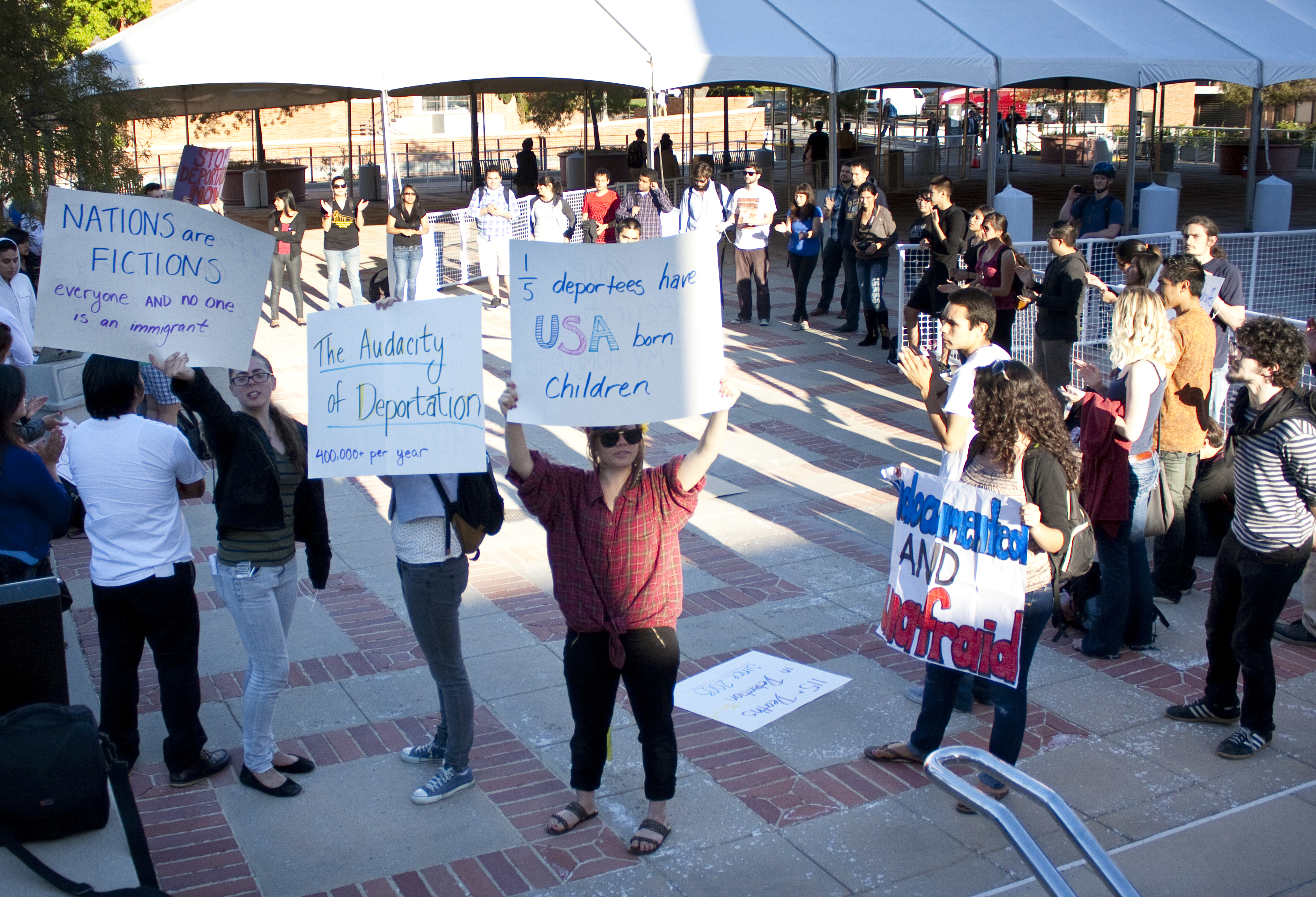
A group of about 45 people gathered outside of Secretary of Homeland Security Janet Napolitano’s speech on Monday to protest deportations of undocumented students and families.
Correction: The original version of this article contained several errors. About 20 demonstrators walked out of the lecture hall during the speech to protest immigration laws in Arizona and deportations of undocumented students and their families. As they left the hall, some chanted phrases such as “Education, not deportation.” The office of Homeland Security was created by former president George W. Bush following the Sept. 11 attacks.
Secretary of Homeland Security Janet Napolitano delivered a lecture at the UCLA Anderson School of Management on Monday, speaking to about 350 people about the role and responsibilities of the federal Department of Homeland Security.
“There is a general understanding that America is safer and more secure than it has been since 9/11,” Napolitano said during her lecture, which was put on by the UCLA Burkle Center and is part of a multi-campus tour that Napolitano is making around the country.
She went on to speak about partnerships between the U.S. and its neighbors, and objectives in improving trade and aviation security.
Students, alumni and other members of the community attended the event. Cindy Fan, vice provost for international studies, said she has long been fascinated by Napolitano and her role as a woman who takes a powerful position in the government.
The office of Homeland Security was created by former president George W. Bush following the Sept. 11 attacks to coordinate efforts to protect the country and its territories from disasters ““ man-made and natural ““ as well as terrorist attacks.
Since its establishment in 2002, the department has had three secretaries, including Napolitano.
“The challenge (of homeland security) is large and complex,” she said. To coordinate homeland security, the department works closely with various American agencies as well as international governments, she added.
Napolitano’s speech drew some dissent.
About 20 demonstrators walked out of the lecture hall during the speech to protest immigration laws in Arizona and deportations of undocumented students and their families by the U.S. Immigration and Customs Enforcement agency, organizers said. The agency is headed by the Department of Homeland Security, which runs under Napolitano’s supervision. As they left the hall, some demonstrators chanted phrases such as “Education, not deportation.”
A number of protesters also chanted the same phrase and “Right to Dream” from outside the building. Their echoes could be heard from inside the lecture hall.
Police officers stood by and monitored the situation, but no confrontations occurred.
“We were trying to make sure that Janet Napolitano addressed the issue of immigration that is so prevalent within the greater L.A. area and within the UCLA community,” said Carlos Castellanos, the external policy chair of IDEAS atUCLA and a third-year political science and philosophy student.
José Quintero, a fifth-year mechanical engineering student who identified himself as an undocumented student, also congregated with about 45 other people outside Korn Convocation Hall where the lecture was taking place. He said he had come out to advocate for a national version of the DREAM Act and to show support for other undocumented students who are facing prospects of deportation.
Other audience members said they did not agree with the protesters’ actions.
“I am really sympathetic to people who are undocumented or came to the U.S. when they were young,” said Mary Smith, a UCLA alumna who attended the lecture. “But I really feel (the protesters) should have listened to what (Napolitano) had to say.”
Napolitano’s lecture was followed by a 20-minute question-and-answer session, in which she responded to queries from the audience.
“We have priorities within immigration enforcement: those who are criminals, those who are repeat violators and those who are violators,” Napolitano said when asked about the department’s deportation guidelines.
“I can’t write a law to protect (undocumented students), only congress can,” she said. “As we protect the law, we try to go after our priorities, but sometimes these students will get involved due to extenuating circumstances,” she added.
Contributing reports by Hirbohd Hedayat, Bruin contributor
